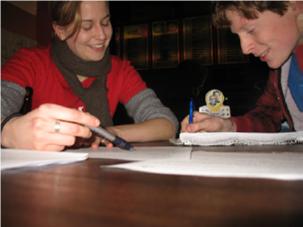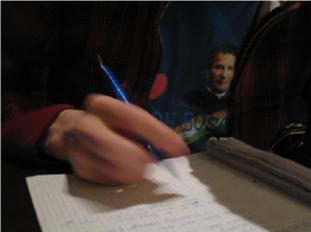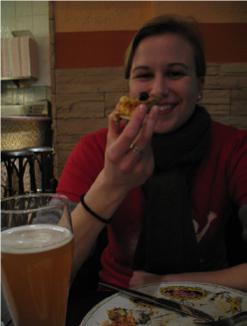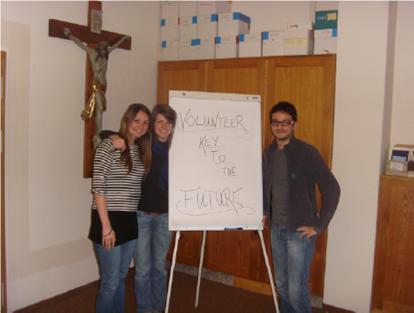Volunteer – Key to the Future: First National Meetings in Germany
The German Province of the Salesians of Don Bosco has been focusing the attention on the topic of voluntarism In the last year. A lot of young people are active on a voluntary basis in Germany. More than 4000 young people every year also decide to make an experience abroad. Aktionszentrum Benediktbeuern and Don Bosco Volunteers Bonn are the responsible salesian organisations in Germany for international voluntary service. About 50 volunteers are sent abroad by these two organisations on a yearly basis. All of them live and work in salesian projects in South America, Europe, Africa and Asia. After this experience they come back to Germany bringing their experiences and acquired skills. Most of them get active in the preparation of new volunteers, becoming mentors for the future generations. This contribution is essential for a successful preparation of new volunteers. Ex-volunteers are also introduced to the activities of Don Bosco Youth Net: they can take part in seminars, youth exchanges and training courses to get involved in youth work activities at European level. Through these activities they can gain competences to start volunteering within the network. In February two national meetings took place in Bonn and Munich. The volunteers could reflect about the challenges of voluntary work in Europe and about their role as volunteers in the society. Here some impressions of the two meetings:
A report form Bonn
Magdalena Strauch, Martin Kreysern
“On February 18th the First National Meeting in preparation of the “Volunteer – Key to the Future” congress was held by Don Bosco Volunteers, Bonn. The meeting took place in Frankfurt am Main with the two participants (Magdalena Strauch, Martin Kreysern) who will represent the Don Bosco Volunteers in the congress in Krakow. In the meeting we first discussed on the challenges facing volunteerism in Europe in general and then we put the spotlight on the Don Bosco Volunteers and the Salesian activities in Germany. We used the study on volunteerism in the EU as a basis as well as the question catalogue provided in the briefing note on the first national meeting. The outcomes of our discussion are based on our personal experience of volunteering in the Don Bosco family. We both have spent a year as volunteer in India during 2006/2007 and have since then participated in the selection and preparation of new volunteers for the Don Bosco Volunteers.
These are the outcomes of our discussion: Don Bosco Volunteers sends out volunteers to Don Bosco projects worldwide. It thereby helps strengthening the worldwide network of the Salesians. The volunteers support the Don Bosco project with their commitment and by bringing in new ideas. A side effect of this volunteer work is the connection which is built between the volunteer and the Don Bosco Family. The returning volunteers will not forget the Salesian idea and many of them will stay connected to Don Bosco in one way or the other. Furthermore, volunteers learn much about themselves while volunteering and might change their perceptions and priorities. Thus, volunteering can help paving the way towards a more socially-oriented and responsible society.
We feel that volunteerism is very valuable and that it should be supported by an adequate structure. In Germany, volunteerism is supported by the government with structures like the “Weltwärts”-programme or the “FSJ”. Unfortunately, these programmes mostly apply to young people finishing school. They are suited for full-time volunteerism for a period from 6-12 months. We think that a suitable frame is needed for older volunteers as well as for regular, part-time volunteer work. In our opinion, volunteer work is gaining acknowledgement in Germany but we also feel, that recognition could be further improved. There are many ways in which volunteerism could further be promoted by local or federal authorities (e.g. tax credits, free/reduced entrance to events or recreational facilities). In addition, the private sector could strengthen its support of volunteerism, though there are several positive examples (e.g. Deutsche Bank).
We moved on to discuss challenges facing Don Bosco Volunteers. In our opinion, a challenge is to make the best use out of the volunteers. Every year, 20 to 30 young people go abroad for volunteering. Upon return to Germany, many of them are interested on continuing their link to Don Bosco. Don Bosco Volunteers itself has only limited use of these returning volunteers, not more than 10 – 15 “graduated” volunteers are needed for the selection and preparation of new volunteers each year. We feel that further efforts are needed in finding a way to keep the returning volunteers connected to Don Bosco in Germany and to give them opportunities to stay involved. In our opinion, a further challenge for Don Bosco Volunteers or the Don Bosco province is to connect or motivate older people to engage for Don Bosco worldwide. We feel that their work could be extremely helpful, since they can look back on years of life experience and professional work.
A Report from Munich
Anika Ballweg, Lisa Gut, Francesco Bagiolini
On the 22nd of February we met in Munich for the first national meeting for the project “Volunteers: key to the future”. Despite of snow and railway strikes we could eventually met in the Jugendwohnheim Salesianum to spend some hours together.
The topic of voluntarism is very important for ex-volunteers, since they spent a year volunteering in a project and they keep on volunteering in their sending organisations, helping other young people in the preparation for their experience abroad. Voluntary service for young people is regulated in Germany by laws: the FSJ (Freiwilliges soziales Jahr) or the FÖJ (Freiwilliges ökologisches Jahr) are examples of possibilities for young people to get active on a voluntary basis in the social sector.
The Salesians of Don Bosco are working with this programmes and started a campaign for interested young people called: ”Mach was sinnvolles” (trans. Do something useful). The first volunteers will start to work in Salesian projects in Germany in September.
Another programme for young people who want to get active as volunteer abroad is “weltwärts”. This programme, supported by the government, offers the possibility to spend a time between 6 and 24 months. Aktionszentrum started to work in the frame of this programme 3 years ago and about 50 young people already took part in it. This year, after the German government agreed to abolish the compulsory military service and civil service, there will be some changes in the programmes for young people: a national voluntary civic service (Bundesfreiwilligendienst) has been created and, in addition to this, a new programme for international voluntary service (Internationaler Jugendfreiwilligendienst) is going to start in summer.
During the discussion we noticed that voluntary service in Germany is well structured but volunteers still don’t get a proper recognition of their work. The Salesians of Don Bosco care for ex-volunteers, trying to involve them in different activities at national and international level. The recognition of their work is essential to keep them motivated in their voluntary work. In particular the cooperation with other organisations in the European network “Don Bosco Youth Net” offers a good framework to empower ex-volunteers with competences, which can help them in their professional life and in their future engagement for young people. Here some comments from Lisa and Anika, the two participants in the congress:
“I started working voluntarily when I was fifteen. I worked for a youth club and organized concerts. To this time I had a lot of problems to get all the knowledge to do my new "job" well. There were no workshops or seminars for young people where they can learn important skills in my area. I never felt much recognition for my work. It seemed always kind of normal that we were doing this. Especially from the heads of my town we were a lot of times very disappointed because they never supported or even respected our work. But still for me it was very important to help this youth center to improve and I learned a lot in all kind of ways.
Later when I started working for the Don Bosco organization I made many good experiences. Especially the training-seminars I enjoyed very much. It was not only good for my skills as a volunteer, also for my personal development. When I was working in India as a Don-Bosco- Volunteer it was my impression that it is very good that volunteers are there, but they were not given much responsibility. Of course there is a difference between every project. I felt more gratitude from the children than from the leaders of the project. “
“I was one year in benin, westafrica, as a volunteer. I have worked in a school as a teacher and in a kindergarden and in a house for raped girls.The work was very necessary for the salesian sisters and for the children. I have learned a lot about the culture, the langu age and I have made some great experience in Benin. And now I´m a volunteer in Benediktbeuern, I´m responsible to guide the new volunteers and inform them about West Africa and the volunteers work there.”
A good sign of active participation and sense of initiative of the ex-volunteers came just before Christmas 2010: ex-volunteers decided to start the so called regional “Stammtische” (a Stammtisch is a place where a group of people regularly meet). Ex-volunteers from Aktionszentrum and Don Bosco Volunteers meet on a regular basis in different places in Germany to plan common actions, to get updated about the last developments in the field of voluntary service and to make their community stronger through the exchange of experiences.
More information about voluntary service in the German Province of the SDB:
www.machwassinnvolles.de
www.donboscovolunteers.de
www.aktionszentrum.de/international
www.strassenkinder.de
28.02.2011




